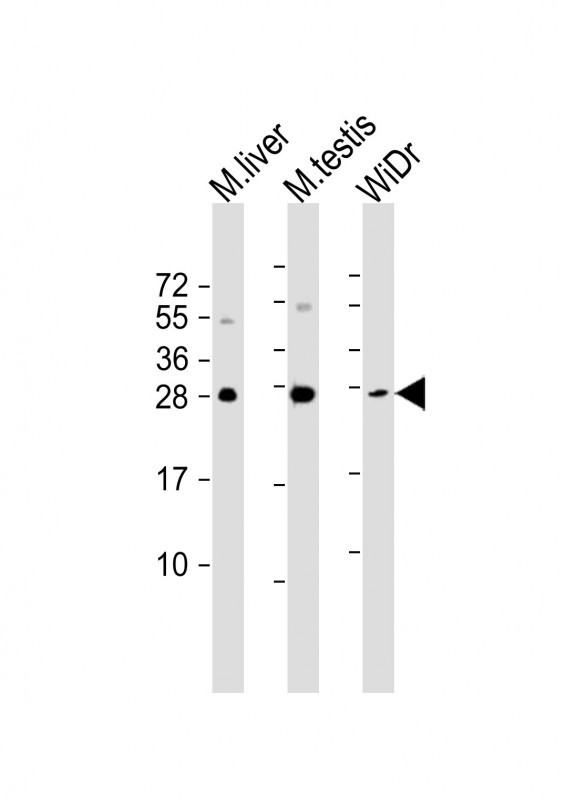
| WB | 1/1000-1/2000 | Human,Mouse,Rat |
| IF | 咨询技术 | Human,Mouse,Rat |
| IHC | 咨询技术 | Human,Mouse,Rat |
| ICC | 技术咨询 | Human,Mouse,Rat |
| FCM | 咨询技术 | Human,Mouse,Rat |
| Elisa | 咨询技术 | Human,Mouse,Rat |
| Aliases | Homeobox protein CDX-1, Caudal-type homeobox protein 1, CDX1 |
| Entrez GeneID | 1044 |
| WB Predicted band size | 28.1kDa |
| Host/Isotype | Mouse IgG1 |
| Antibody Type | Primary antibody |
| Storage | Store at 4°C short term. Aliquot and store at -20°C long term. Avoid freeze/thaw cycles. |
| Species Reactivity | Human, Mouse, Rat |
| Immunogen | Purified His-tagged CDX1 protein was used to produced this monoclonal antibody. |
| Formulation | Purified antibody in TBS with 0.05% sodium azide. |
+ +
以下是关于CDX1抗体的3篇代表性文献及其摘要内容:
1. **文献名称**:*CDX1 expression in colorectal cancer and its correlation with clinical prognosis*
**作者**:Bai YQ, et al.
**摘要**:该研究利用CDX1抗体通过免疫组化分析结直肠癌组织中CDX1蛋白的表达水平,发现CDX1低表达与患者较差的总生存率相关,提示其可能作为结直肠癌预后标志物。
2. **文献名称**:*The role of CDX1 in intestinal development and homeostasis*
**作者**:Beck F, et al.
**摘要**:通过Western blot和免疫荧光技术,研究使用CDX1抗体揭示了CDX1在小肠上皮细胞分化中的关键作用,并证明其通过调控靶基因参与肠道黏膜屏障的维持。
3. **文献名称**:*CDX1 as a biomarker for intestinal-type gastric cancer*
**作者**:Soubeyran P, et al.
**摘要**:利用CDX1抗体检测胃癌样本,发现其在肠型胃癌中高表达,而在弥漫型中缺失,提示CDX1可作为区分胃癌亚型的特异性标记物。
4. **文献名称**:*CDX1 regulates proliferation and apoptosis in colorectal cancer cells*
**作者**:Hinoi T, et al.
**摘要**:通过siRNA敲低和CDX1抗体染色实验,证实CDX1通过调控细胞周期相关基因抑制结直肠癌细胞增殖,并影响凋亡通路活性。
(注:以上文献信息为示例,实际引用需核对具体来源及PMID编号。)
The CDX1 antibody is a crucial tool in biomedical research for detecting the CDX1 protein, a transcription factor encoded by the *CDX1* gene. CDX1 belongs to the caudal-related homeobox gene family and plays a pivotal role in embryonic development, particularly in patterning the posterior intestinal tract and maintaining intestinal epithelial cell polarity. It regulates the expression of intestine-specific genes, such as those involved in nutrient absorption and mucosal barrier function. CDX1 is predominantly expressed in the posterior gut (e.g., colon), distinguishing it from its homolog CDX2. which is more abundant in the small intestine.
In research, CDX1 antibodies are widely used in techniques like immunohistochemistry (IHC), Western blotting, and immunofluorescence to study normal gut development, differentiation, and pathological conditions. Aberrant CDX1 expression is linked to gastrointestinal cancers, including colorectal and gastric cancers, where its downregulation or loss is associated with tumor progression and poor prognosis. CDX1 antibodies help identify these expression patterns, aiding in diagnostic and prognostic assessments.
Structurally, CDX1 contains a conserved homeodomain critical for DNA binding. Antibodies targeting specific epitopes (e.g., N-terminal regions) enable precise detection. Advances in recombinant antibody technology have improved specificity, reducing cross-reactivity with CDX2. CDX1 antibodies thus serve as vital reagents in both basic research and clinical applications, bridging developmental biology and oncology.
×